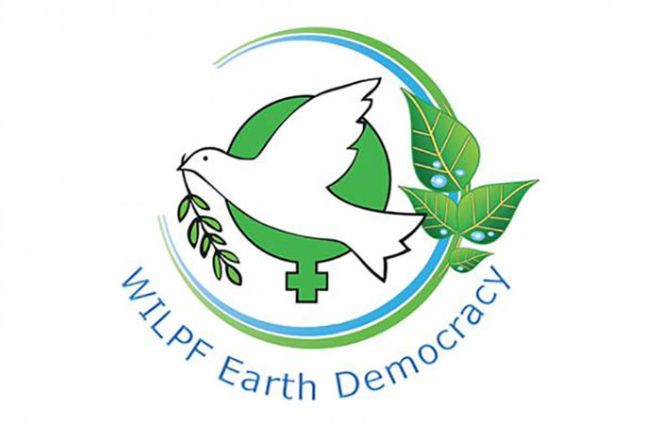Updates from 35th Triennial Congress and Earth Democracy’s Three Special Projects
Published on August, 59 2024
by Jean Hays and Nancy Price
Co-Chairs, Earth Democracy Committee
July/August 2024
We would like to thank the speakers at our 35th Triennial Congress who presented such a wide range of topics on the theme “Water on the Frontlines for Peace.” If you were able to attend only a few of the presentations or none at all, here’s the list of recordings.
Movement on Ban of PFAS in Vermont
 For a number of years, Earth Democracy focused on our Military Poisons Project (link militarypoisons.org) with Pat Elder and the Vermont PFAS and Military Poisons Coalition grassroots education and legislative work. We congratulate the Coalition members and Coalition Coordinator Marguerite Adelman that on May 7, the Vermont Legislature passed a nation-leading bill to protect Vermont residents from PFAS.
For a number of years, Earth Democracy focused on our Military Poisons Project (link militarypoisons.org) with Pat Elder and the Vermont PFAS and Military Poisons Coalition grassroots education and legislative work. We congratulate the Coalition members and Coalition Coordinator Marguerite Adelman that on May 7, the Vermont Legislature passed a nation-leading bill to protect Vermont residents from PFAS.
This bill (S.25) will ban per- and polyfluorinated substances (PFAS) and other toxic chemicals from personal care products, and from apparel, cookware, artificial turf, and children’s products. The bill includes a first-in-the-nation ban on phthalates, formaldehyde, mercury and lead, among other harmful chemicals in menstrual products, and the first ban on PFAS in incontinence products. Each vote on this bill in the Vermont Senate and House was unanimous, and it now heads to the governor’s desk for consideration.
Earth Democracy will continue with our work on the Human Right to Health and Water, and pick up on our earlier 2015 work on Climate Justice, Women + Peace.
Join a Special Project
We welcome you to join one of these Special Projects briefly described here.
If you love researching, writing, and media work, if you are an artist, poet or thrive on strategic planning, please email Nancy Price at EarthDemocracy@wilpfus.org.
Briefly, after Labor Day, our three new Special Projects are:
- The Fossil Fuel Non-Proliferation Treaty is spearheaded by a block of nation-states concerned that the world needs a treaty to manage a global ‘Just Transition’ away from coal, oil and gas. It’s no longer possible to ignore the countries that claim to be climate leaders while continuing to open, approve and fund new fossil fuel projects. Obviously, it’s impossible to reduce emissions without lowering demand.
- Though fossil fuels are recognized as the main drivers of the climate crisis, they are not mentioned in the 2015 Paris Climate Agreement, when participating countries agreed that an increase in global warming should stay “well below 2℃”, and they should try to limit temperature increases to 1.5℃ above pre-industrial levels — a limit we are in danger of reaching with no turning back.
- Though fossil fuels are recognized as the main drivers of the climate crisis, they are not mentioned in the 2015 Paris Climate Agreement, when participating countries agreed that an increase in global warming should stay “well below 2℃”, and they should try to limit temperature increases to 1.5℃ above pre-industrial levels — a limit we are in danger of reaching with no turning back.
- A focus on COP 29, the Conference of Parties at the 2024 United Nations Climate Change Conference, November 11-22, 2024 in Baku, Azerbaijan. The fact that Mukhtar Bahayev will preside at this COP has raised serious concerns about how discussions will proceed at COP 29, given that he has worked in the state-owned oil company SOCAR for 26 years and that, in 2023, Azerbaijan relied on oil and gas for more than 92% of its export revenue.
- Indeed, there is a much-needed COP 29 discussion on the new “Roadmap to Mission 1.5℃”. At this COP, it is crucial that there is better international cooperation and progress by each country clearly stating what their Nationally Determined Contribution will be to reduce greenhouse gas emissions to keep warming at 1.5℃ or at least below 2℃.
- Indeed, there is a much-needed COP 29 discussion on the new “Roadmap to Mission 1.5℃”. At this COP, it is crucial that there is better international cooperation and progress by each country clearly stating what their Nationally Determined Contribution will be to reduce greenhouse gas emissions to keep warming at 1.5℃ or at least below 2℃.
- Collaborate with the Disarm/End Wars committee to develop educational materials and factsheets on how global military spending, including by the NATO countries, accelerates climate breakdown.
- For example, in “Climate Crossfire”, published in October 2023, it was calculated that if all members of NATO meet the commitment of spending at least 2% of GDP on the military, by 2028 this would lead to a total estimated collective military carbon footprint of 2 billion tons of CO2, greater than the annual GHG emissions of Russia. NATO would also spend an estimated additional $2.57 trillion, enough to pay for what the United Nations Environment Program (UNEP) estimates as the climate adaptation costs for low- and middle-income countries for 7 years.
There’s no doubt that it is time for the US peace organizations to come together to build a vigorous, robust and diverse peace movement in this country grounded in racial, social, economic and environmental justice and human rights. It’s time to make the case for moving from a war economy to a peace economy, to move from ‘Warheads to Windmills’ and a ‘Just Transition’ to sustainable, renewable green energy. Remember, nuclear power is not green.



